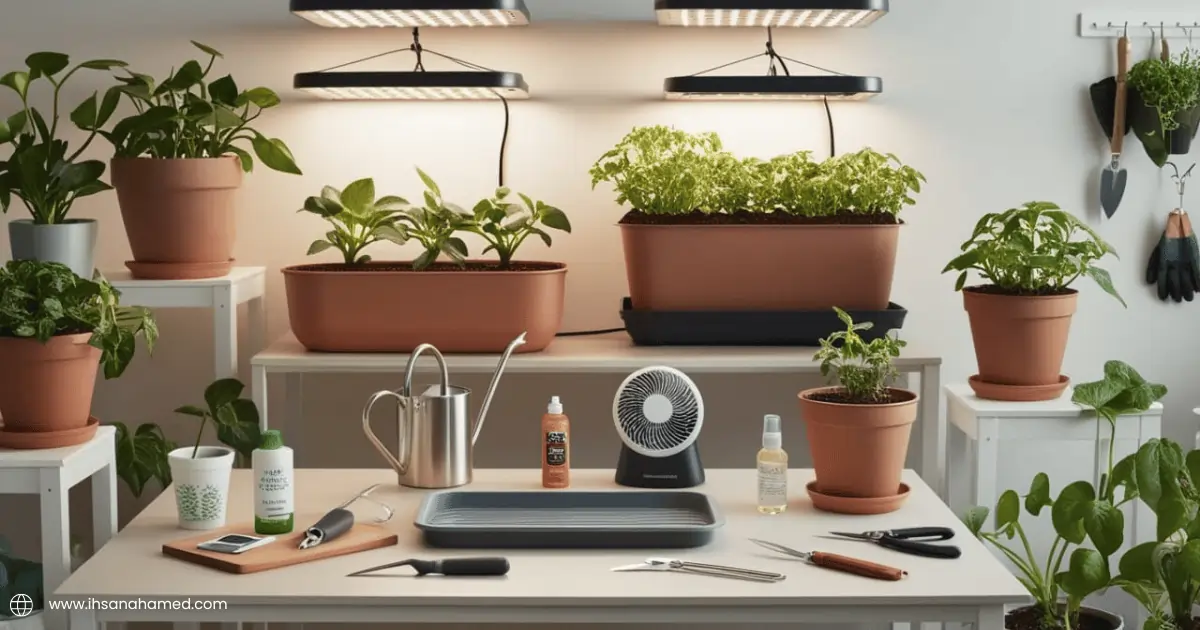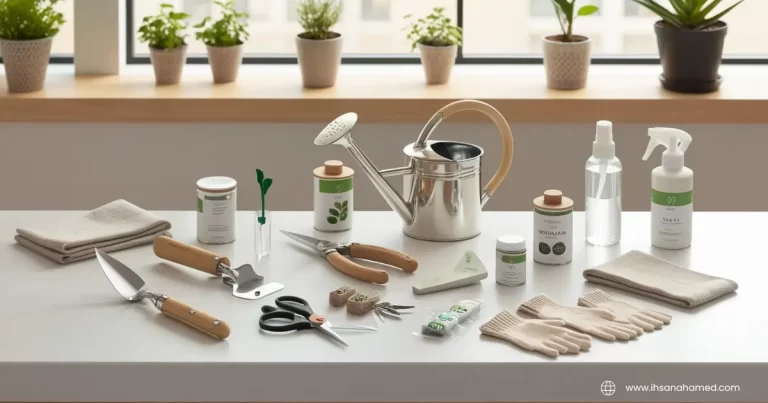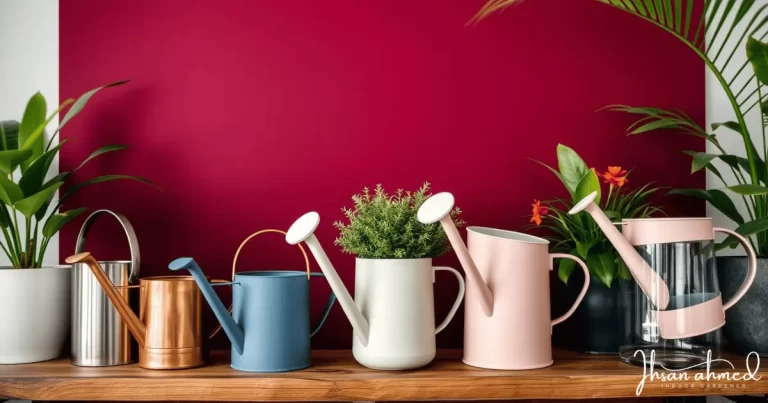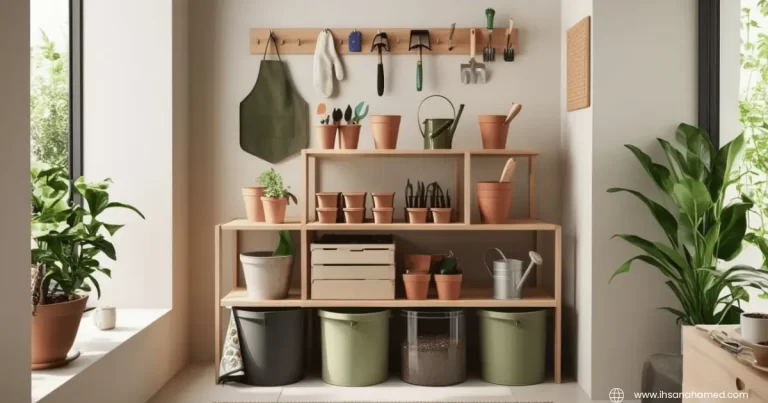Quick Guide (Essential indoor gardening supplies)
If you don’t know which are the most essential indoor gardening supplies to start indoor gardening, we have listed a few most essential for every indoor.
- Soil Mix – Most essential supplies for healthy root growth
- Watering Can – Helps to control water flow and prevent overwatering especially with long sprouts.
- Grow Lights – IF your home is not sufficient with natural, try this alternative method.
- Plant Fertilizers – Use liquid or slow-release fertilizers to keep your plants healthy throughout the year.
- Moisture Meter – Avoid overwatering and underwatering by exactly measuring the soil.
1. Grow Lights
Grow lights are essential supplies for indoor gardening, the home doesn’t have sufficient natural sunlight. In these situations, we need to consider grow light as a mandator for them to grow indoor plants
Features
- LED full spectrum comes with blue, red, and green. Every color has its own features.
- Allows them to control the brightness of different stages of the plants.
- Height adjustments, able to change the angle and target the specific areas.
- Automation in timers to change the schedule for day and night depends on the model.
- These lights are operated on a silent model without any loud fans.
Pros
- Grow lights allow plants to cultivate throughout the year.
- Control day and night cycles.
- Portable and easy to set up in small spaces.
- Faster growth and high yield.
Cons
- Few models like high heat and it harms the plants.
- Some grow lights cannot cover large areas.
- Overbright may disturb other living areas and need to use a tent to control the light exposure.
2. Containers
It’s essential for every indoor space to grow plants, it’s available in different shapes, sizes, and materials. These pots and planters help the root development to grow plants healthy and stronger.
Features
- Comes in different materials such as plastics, terracotta, ceramic, metals, wood, and fabric grow bags.
- Build on various shapes and sizes.
- Drainage holes are essential for waterlogging to prevent overwatering.
- Temperature regulation with double-walled containers keeps the roots cool in summer and warm in winter.
- Use hanging and wall-mounted planters for space savings.
Pros
- Lightweight and easy to move.
- Cost-effective and low maintenance.
- Flexibility and safety for kids and pets.
- Easy to drill for drainage if drainage holes are not available in containers.
Cons
- Limiting the root systems and repotting the pots frequently.
- Heavy and large containers make it difficult to move the location of the plants.
- High-quality containers are very expensive and low-cost containers have quality issues.
3. Quality Soil Mix
Best and high-quality soil mix is mandatory for every plant that supports their growth, tasty herbs and vegetables bring flavor dishes to the plants during harvest.
Features
- Good quality soil comes with a mixture of sand, silt, and clay providing good aeration, drainage, and moisture retention.
- Good quality soil mixes essential nutrients such as nitrogen, phosphorus, and potassium that provide plant growth.
- Quality soil mixes are pH-balanced and adjustable.
- Quality soil mixes are free from pests and diseases.
- Organic content and customizable for multipurpose use.
Pros
- Rich in nutrients and balanced pH.
- Prevent waterlogging and other water-related issues.
- Safe for all types of plants and encourages root systems.
- Sustainable ingredients and ready to use.
Cons
- Purchase frequently for repotting and larger plants
- Expensive, seasonable availability and required special orders based on requirements.
- High-quality mixes are designed for all types of plants and are not suitable for specific types of plants.
4. Self-Watering Planters
Self-watering planters are a unique and innovative design built on reservoirs. No need to maintain them or frequent visits for watering. Can be able to manage the watering for plants on a weekly basis without watering because it has reserves for watering.
Features
- Consistent moisture supply and prevent water frequency.
- Prevent waterlogging and avoid overwatering.
- Easy to monitor and maintain.
- Save water and low maintenance.
- Modern design, neat and tidy.
Pros
- Encourage root growth.
- Easy to use and suitable for various plants.
- Practically beneficial for beginners.
- More sustainable and eco-friendly.
- Prevent overwatering and underwatering.
Cons
- Expensive and complex knowledge of assembling the parts.
- Not suitable for all types of plants.
- Difficult to relocate the places due to complexity and weight.
5. Watering Can
Important and essential indoor gardening supplies for every gardener that allows precise watering. Water flows and quantity of water is controllable in advanced designs.
Features
- Variety of sizes and durable materials.
- Easy to handle and can control water flow.
- Dual handle system, top handle for carrying, and side handle for pouring water.
- Easy to refill and able to mix water and liquid fertilizer to feed plants.
- Lightweight, portable, and can be made through recyclable materials.
Pros
- Easy to carry and convenient for indoor use.
- Best for small spaces.
- Suitable for all types of plants.
- Affordable and low maintenance.
Cons
- Limited capacity and frequent refilling.
- Not suitable for a larger garden.
- Plastic materials are not eco-friendly.
6. Moisture Meter
A moisture meter is an essential hand tool to monitor the soil levels before watering to prevent overwatering and underwatering. It is useful for beginners to deal with various types of plants.
Features
- Comes with single and double probes, with more accurate readings by an average of two moisture points in double probes.
- Customizable settings and indicate the soil status by color such as green, yellow, and red.
- Small and lightweight, easy to carry.
- Real-time readings using sensitive sensors.
- Made in durable material such as plastic and materials useful for various soil types and conditions.
Pros
- Prevent overwatering and underwatering from diseases and pests
- User-friendly and quick results
- Affordable and long-lasting.
- Select a plant choice based on soil moisture conditions.
Cons
- Cheaper models do not provide accurate and consistent readings.
- Few moisture meters come in short probes, we can’t read the deeper soil and it is not suitable for all plant types.
- Time-consuming for larger gardens
7. Pruning Shears
Pruning shears are essential and trimming tools for removing dead leaves and encouraging healthy growth. It helps to shape the plants, promote overall health, and prevent diseases.
Features
- Made with high-carbon steel, stainless steel, and titanium-coated blades.
- Comfort grip and rotating handle.
- Most pruning shears come with safety locks to keep the blade closed when not in use.
- Customizable fit and lightweight materials.
- Stylish design and bright colors.
Pros
- Precise for clean and accurate cuttings.
- Comfortable to use in one hand.
- Suitable for various tasks such as trimming, pruning, removing dead leaves, and a few other tasks too.
- Low maintenance and Affordable.
Cons
- Limited cutting capacity and not suitable for thicker stems.
- Maintenance is required for sharpening blades and regular cleaning of blades with oil from rusting.
- High-quality pruning shears for advanced uses and more expensive.
8. Plant Fertilizer
Plant fertilizers are important and crucial for supplying essential nutrients for plants to grow stronger and healthy. It’s available in liquid, granular, and slow-release form.
Features
- Most fertilizers contain essential macronutrients like Nitrogen (N), Phosphorus (P), and Potassium (K).
- Improve soil quality from organic fertilizers.
- Nutrients are directly available to plant roots.
- Adjusted against soil pH levels.
- Free from chemicals and eco-friendly.
Pros
- Feed nutrients based on nutrient deficiency based on diseases such as yellow leaves or stunted growth.
- Improved production and more vibrant.
- Easy to use and has a variety of forms.
- Faster yields and higher crop yield.
Cons
- Over-fertilization may burn plants and disrupt the soil.
- Expensive if you use it frequently.
- Synthetic fertilizer may harm plants and the environment.
9. Humidity Tray
Effective essential supplies to boost moisture levels and useful for high humidity plants. Easy to use by filling water and pebbled, place it near plants and benefit for ferns and orchids.
Features
- Maintain humidity and prevent root rot.
- Improve airflow and better air circulation.
- Available in various shapes and sizes based on plant needs.
- Customizable and space-saving.
- Simple to clean and reusable.
Pros
- Increase humidity and improve plant health.
- Control the moisture level without soaking the soil.
- Easy to use, can work without electricity, and works for various plants.
- Prevent pest infestation and keep the pests away.
Cons
- Not suitable for larger areas and few plants.
- Regular cleaning and trays need to be refilled regularly.
10. pH Tester
pH tester is an essential tool for measuring the soil’s acidity and alkalinity. pH test can be able to monitor the soil condition and change it according to plant growth.
Features
- Digital display, clear readings with calibration features.
- Temperature sensor and compact sizes.
- Easy to use, simple interface, and faster results.
- Suitable for deep soil testing.
- Low maintenance and digital options with battery-operated models.
Pros
- Improves plant health and prevents nutrient deficiencies.
- Quick results for easy and flexible adjustments.
- Suitable for various plants and multiple uses.
- Cheap and affordable for preventing over-fertilization.
- Simple to operate and portable.
Cons
- Few pH testers have a limited lifespan.
- A basic model can be used to check pH levels but it is not suitable to check nutrients and moisture levels.
- Low-quality testers are inaccurate and not consistent in readings.
11. Trowel
Trowels are small and handy essential tools for indoor gardening for digging, transplanting, and mixing the soil easily and efficiently. It is a perfect and compact size to work in pots and containers.
Features
- Made in stainless steel and carbon steel.
- Available in various sizes, small sizes are used for detailed work like planting trees.
- Available in different blade shapes such as pointed blades, rectangular blades,s, and curved blades.
- Lightweight, easy to carry, and perfect for indoor use.
- Some trowels have markings on blades, useful for planting and seeding at exact depths.
Pros
- Small and easy to hold and carry for quicker tasks.
- High-quality trowels are made in stainless steel or carbon steel which is hard to bend or break.
- Affordable and cost-effective for professionals and beginners.
- The trowel is enough for smaller tasks and is more efficient than bigger tools.
Cons
- Limited capacity, not suitable for hard and rocky soil.
- Not able to work in tight spaces like hand pruners and narrow dibbers
- The size and force of the trowel may cause damage to plants.
12. Fan
The fan is an essential indoor gardening supply for promoting air circulation and benefits to plants. It prevents mold and strengthens the stems.
Features
- Provide Air circulation around plants.
- Strengthen the stems for health and grow stronger.
- Maintaining indoor humidity to prevent diseases.
- Customize the fan settings based on specific plant needs.
Pros
- Proper airflow control from pests and diseases.
- Distribute CO2 around plants by giving access to necessary levels for photosynthesis.
- Can replicate outdoor conditions like natural wind.
Cons
- Running a fan continuously may lead to an increase in electricity usage.
- Cheaper fans can produce noises that can disrupt the indoor environment.
13. Spray Bottle
Spray bottles are essential to maintain the highest humidity into normal humidity by misting into leaves that apply natural humidity to stay healthy.
Features
- Adjust the spray nozzles for fine mist and direct spray based on plant needs.
- Compact, small in size, and easy to store for quick use.
- Durable material and transparent body.
- Uniform misting and each plant receive the same amount of moisture.
Pros
- It maintains the humidity and prevents overwatering.
- Easy to use with foliar fertilizers, insecticidal soaps, and leaf shine products.
- Improve health and cost-effectiveness.
Cons
- Most spray bottles have a small capacity, frequent refilling, and are not suitable for larger plants.
- Not suitable for all types of plants and requires regular cleaning.
14. Compost Bin
Small indoor compost helps you to recycle kitchen wastes and scraps into Healthy nutrients that can boost plants’ health and grow stronger.
Features
- With compact sizes and design to fit in small spaces, it’s ideal for small homes and apartments.
- Some bins come with an inner bucket for simplifying the process and cleaning.
- Available in various colors and sizes for aesthetic appearance.
- Some models are made with recycled materials and are eco-friendly.
- Advanced composts indicating compost progress, moisture level, and usage.
Pros
- Reduce waste and convenience to use throughout the year without worrying about the season.
- Produce high-quality compost to enrich the soil.
- Improves soil health and supports microorganisms.
- It reduces the pests’ attraction from kitchen waste.
Cons
- Limited space and attracts pests if not maintained properly.
- It takes time to produce usable compost.
- High-quality indoor are the most expensive and not suitable for beginners.
15. LED Light Timer
LED Light Timer is an important tool for indoor gardeners that allows the schedule of the grow lights to receive consistent and optimal light exposure for healthy growth and maximizing yields. You can set the timers for day and night based on the plant’s needs and climate.
Features
- You can set daily and weekly schedules, you can turn on/off, and adjustments for sunrise and sunset.
- You can set gradual dimming and customizable scenes.
- LED lights on/off when motion is detected.
- Some advanced LED systems can adjust the brightness based on the lighting conditions of the room.
- Advanced systems are controlled by remote and voice commands.
Pros
- Lower utility bills and longer lifespan.
- Eliminate manual turn on/off and timers control the automation.
- It acts as its own customizable and works based on our needs.
- Can be integrated with smart home systems and controlled by apps and voice commands.
Cons
- Little complicated and compatible issues.
- Upfront and maintenance costs are expensive.
- Technical issues and limited flexibility compared to smart light systems.
16. Portable Greenhouse
The portable greenhouse is a compact and moveable structure to create a controlled environment inside the home. It regulates temperature, humidity, and light and is perfect for growing plants with care like seedlings.
Features
- Compact and lightweight design, easy to move, and foldable.
- Made of sturdy materials and rust-resistant.
- Protective fabric and temperature control.
- Can be built-in shelves and customizable.
- Quick and easy to set up with multiple size options.
Pros
- Allows for extended growing seasons and protects from frost, cold, and hot climates encouraging year-round vegetable growing.
- Portable, relocatable, and suitable for patios, balconies, and indoor.
- Affordable, quick assembly, and low maintenance.
- Customizable layout, space-saving, and perfect for urban gardeners.
Cons
- Not sturdy as a permanent greenhouse and shorter lifespan.
- Overheat makes it difficult to regulate temperature without proper ventilation.
- You need to monitor the conditions frequently and adjust ventilation, humidity, and temperature manually.
17. Garden Gloves
Garden gloves are an essential tool to protect your hands when planting, pruning, and soil mixes. It provides comfort and safety from sharp blades and tools. Make your gardening task safe, easier, and more enjoyable.
Features
- Comes in various materials such as leather, cotton, nitrile, and rubber.
- Gives safety and protection during digging and handling hard objects.
- The breathable design allows air and prevents excess sweat leads to skin irritation and discomfort.
- Grip enhancement while handling tools and plants.
- Touch screen compatibility uses smartphones and devices without removing gloves.
Pros
- Hand protection and prevention from accidents and injuries.
- Improve grip and better control.
- Keep your hand clean and prevent infection.
- Multipurpose use such as DIY projects, planting, digging, and soil mixing.
Cons
- Rubber and synthetic fabrics lead to excess sweating and discomfort.
- High-quality gloves are more expensive with specialized features such as touchscreen capability and thorn resistance to protect from sharp objects.
- Short lifespan for some materials such as disposable and low-cost gloves.
Conclusion:
These 17 tools are essential indoor gardening supplies for every gardener to maintain indoor gardening from containers, lighting, watering tools, soil management, and pest control.
These tools have their own pros and cons but consider high quality and eco-friendly materials to maintain your standard, and make you successful in indoor gardening.
Do you want to improve indoors check out our guides on growing tasty tomatoes and Hydroponics vs traditional soil methods.
You can experiment with each and every tool, you can become a master in indoor gardening by test and trial. Continue your indoor gardening journey from seeding to harvesting and enjoy tasty dishes at your home for salad throughout the year without worrying about the season.
Why do I need grow lights for indoor gardening?
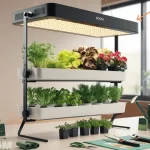
Grow lights are essential if your home doesn’t get enough sunlight. They help plants grow indoors by providing the necessary light.
What are self-watering planters?
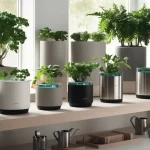
Self-watering planters have a built-in water reservoir. This lets the plants get water when needed, so you don’t have to water them as often.
How does a moisture meter help in gardening?
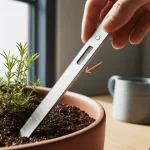
A moisture meter tells you if the soil is too dry or too wet. It helps prevent overwatering or underwatering your plants.
What are the benefits of using garden gloves?
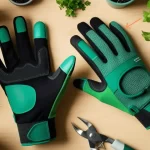
Garden gloves protect your hands from injuries, give you a better grip on tools, and keep your hands clean while gardening.
What is the use of a portable greenhouse?
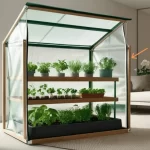
A portable greenhouse creates a controlled environment for your plants, helping them grow by regulating temperature, humidity, and light. It’s great for year-round gardening.
